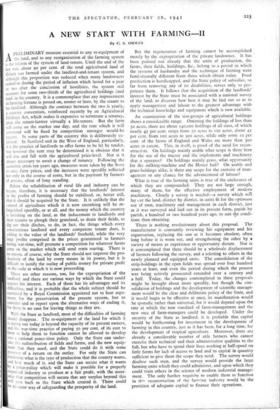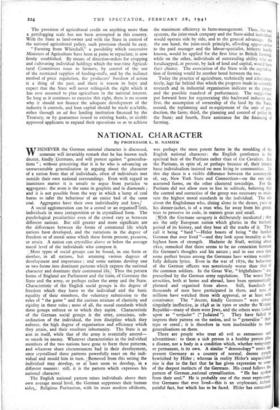A NEW START WITH FARMING II
By C. S. Olt ‘N I A PRELIMINARY measure essential to any re-equipment of A the land, and to any reorganisation of the farming system is the reform of the system of land-tenure. Until the end of the last war, about 90 per cent. of the total agricultural land of Britain was farmed under the landlord-and-tenant system, and although this proportion was reduced when many landowners cashed-in during the period of inflation which lasted for a year or two after the conclusion of hostilities, the system still accounts for some two-thirds of the agricultural holdings (and land) in the country. It is a commonplace that any improvement in farming fortune is passed on, sooner or later, by the tenant to his landlord. Although the contract between the two is yearly, a country convention, reinforced recently by an Agricultural Holdings Act, which makes it expensive to terminate a tenancy, zives the tenant-farmer virtually a life-tenure. But the farm will come on the market one day, and the rent which it will command will be fixed by competition amongst would-be tenants. In some parts of the country this is deliberately ex- ploited. In Scotland and in the West of England, particularly, it is the practice of landlords to offer farms to be let by tender, but however the rent may be determined it is obvious that it will rise and fall with the agricultural price-level. Nor is it always necessary to await a change of tenancy. Following the economic crisis ten years ago, measures were taken by the State to raise farm prices, and the increases were speedily reflected not only in the course of rents, but in the payment by farmers of arrears, often of long standing.
Before the rehabilitation of rural life and industry can be begun, therefore, it is necessary that the landlords' interest in the profits of farming should be stabilised, or, better still, that it should be acquired by the State. It is unlikely that the control of agriculture which it is now exercising will be re- linquished speedily, or at all, and the money which the country is lavishing on the land, as the inducement to landlords and their tenants to plough their grassland, to drain their fields, to dig out their ditches, to. do, in fact, the things which every conscientious landlord and every competent tenant does, is adding to the value of the landlords' freehold, while the very large profits comprised in the prices guaranteed to farmers during war-time, will promote a competition for whatever farms come on the market which will send rents soaring. There is no reason, of course, why the State should not improve the pro- ductivity of the land by every means in its power, but it is difficult to justify the outlay of public money for private profit on the scale at which it is now proceeding.
There are other reasons, too, for the expropriation of the landlord, and there are various ways by which the State could acquire his interest. Each of them has its advantages and its difficulties, and it is probable that the whole subject should be examined by a Royal Commission appointed not to hear argu- ments for the preservation of the present system, but to consider and to report upon the alternative ways of ending it, for there is no case for leaving things as they are.
With the State as landlord, most of the difficulties of farming should disappear. The re-equipment of the land for which it Is crying out today is beyond the capacity of its present owners, and the war-time practice of paying so per cent. of its cost to them to help them to function cannot be allowed to develop into a national peace-time policy. Only the State can under- take the redistribution of fields and farms, and the new equip- ment that they need, and the State could do it with some prospect of a return on the outlay. For only the State can determine what is the type of production that the country wants, and how much of it, and the State can secure what it wants by a price-policy which will make it possible for a properly organised industry to produce at a fair profit, with the assur- ance that competition will secure that any surplus beyond this will pass back to the State which created it. There could be no surer way of safeguarding the prosperity of the land. But the regeneration of farming cannot be accomplished merely by the expropriation of the private landowner. It has been pointed out already that the units of production, the farms, their fields, buildings, &c., belong to a period in which the systems of husbandry and the technique of farming were fundamentally different from those which obtain today. Food production is handicapped, and the State policy of subsidies, so far from removing any of its disabilities, serves only to per- petuate them. It follows that the acquisition of the landlords' interest by the State must be associated with a national survey of the land, to discover how best it may be laid out so as to apply management and labour to the greatest advantage with the technical knowledge and equipment which is now available.
An examination of the size-groups of agricultural holdings shows a considerable range. Omitting the holdings of less than 5o acres, there are about 140,000 holdings of all sizes, of which nearly 45 per cent. range from 5o acres to too acres, about 45 per cent. from too acres to 300 acres, while only some to per cent. of the farms of England and Wales are more than 300 acres in extent, This, in itself, is proof of the need for recon- struction. On holdings mainly arable what scope is there here for the use of the tractor and the implements and machinery that it operates? On holdings mainly grass, what opportunity for the milking-machine and the Hosier bail? On arable and grass-holdings alike, is there any scope for the exercise of man- agement or any chance for the advancement of labour?
What is true of the farming units is true of the enclosures of which they are compounded. They are not large enough, many of them, for the effective employment of modern machinery. Clearly a survey is needed—a survey which will lay cut the land, district by district, in units fit for the optimum use of men, machinery and management in each district, just as it was surveyed and laid out in its present form, parish by parish, a hundred or two hundred years ago, to suit the condi- tions then obtaining.
There is nothing revolutionary about this proposal. The manufacturer is constantly reviewing his equipment and his organisation, replacing the one as it becomes obsolete, often long before it is worn out, and strengthening the other by a variety of means as experience or opportunity dictate. Nor is it contemplated that there should' be a wholesale displacement of farmers following the survey, and a reletting to others in the newly planned and equipped units. The consolidation of the strip-holdings in the open fields was spread over four hundred years at least, and even the period during which the process was being actively prosecuted extended over a century and a half. Today, the changes contemplated in these proposals might be brought about more speedily, but though the con- solidation of holdings and the development of scientific manage- ment would be the clear and deliberate policy of the State, and it would begin to be effective at once, its manifestation would be sporadic rather than universal, for it would depend upon the rate at which the new standard of farm-management and the new race of farm-managers could be developed. Under the security of the State as landlord, it is probable that capital would be forthcoming for investment in the development of farming in this country, just as it has been, for a long time, for the development of tropical agriculture. Moreover, there an already a considerable number of able farmers who cannot exercise their technical and their administrative qualities to the full, but who have to spend their lives working at half-speed on little farms for lack of access to land and to capital in quantity sufficient to give them the scope they need. The survey would disclose such men, and the survey would provide the large farming units which they could administer, and upon which they could train others in the science of modern industrial manage- ment. The only further requisite to enable them to function in th;c reconstruction of the farrnine industry would be the provision of adequate capital to finance their operations. The provision of agricultural credit on anything more than a pettifogging scale has not been attempted in this country. With the State as land-owner and with the State in control of the national agricultural policy, such provision should be easy.
" Farming from Whitehall," a possibility which successive Ministers of Agriculture have been at pains to repudiate, is now firmly established. By means of direction-orders for cropping and cultivating individual holdings which the war-time Agricul- tural Committees issue to farmers, by control of the use of the restricted supplies of feeding-stuffs, and by the indirect method of price regulation, the producers' freedom of action is a thing of the past, and there is reason to hope and expect that the State will never relinquish the right which it has now assumed to plan agriculture in the national interest. So long as it continues to exercise this right, there is no reason why it should not finance the adequate development of the industry it controls, and loan capital should be made available, either through an ad hoc lending institution financed by the Treasury, or by guarantees issued to existing banks, to enable approved applicants to expand their operations so as to achieve the maximum efficiency in farm-management. Thus, the two systems, the joint-stock company and the State-aided individual, would operate side by side, and to the general advantage. On the one hand, the joint-stock principle, affording opportunities to the paid manager and the labour-specialist, hitherto hardly known, would be applied for the first time to British farming, while on the other, individuals of outstanding ability who are handicapped, at present, by lack of land and capital, would have their chance. The association of the State with the capitalisa- tion of farming would be another bond between the two.
Today the practice of agriculture, technically and administra- tively, lags far behind that which the progress made in scientific research and in industrial organisation indicate as the proper and the possible standard of performance. The sugge,-,tions put forward here for regenerating this backward industry are, first, the assumption of ownership of the land by the State; second, the replanning and re-equipment of the unit of pro- duction, the farm; third, the planning and control of policy by the State; and fourth, State assistance for the financing of farming.



























 Previous page
Previous page